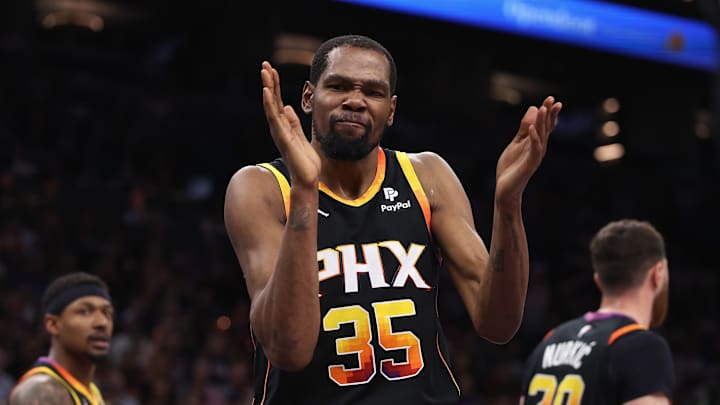It is hard to dissect the disappointment that was the 2023-24 Phoenix Suns season, from the great play that the franchise saw from some of their key players throughout the campaign. By far the most difficult is superstar Kevin Durant, who at 35-years-old turned in another fantastic season individually.
By season's end he had been named to the All-NBA Second Team, and the 27.1 points each night was more than on one of the four occasions he had been named the scoring champion of the league in the past. When the Suns needed him, he was there, and his play on the court backed up owner Mat Ishbia's insistence that the organization trade for him in the first place.
Lurking beneath all of that however is a dreadful playoff sweep at the hands of the Minnesota Timberwolves, which complicates Durant's final grade even further.
Back to the good bits though, and we ranked Durant the MVP of this team in both the first-quarter and first-half of the season. With Bradley Beal usually out injured during this period and Devin Booker adjusting to being the Suns' main facilitator, it was Durant who had consistently massive games to keep the Suns in the hunt.
The 41.3 percent from deep he managed was considerably higher than his career average of 38.7 percent, but it was on the defensive end where he really excelled. So much so that to not receive any love at all in the Defensive Player of the Year voting felt like a snub.
Bob Myers:
— 𝐇𝐚𝐭𝐞𝐝 ✰ (@Hatedzs) February 11, 2024
“ Kevin Durant was the best player in every finals series featuring Lebron James and Steph curry “ pic.twitter.com/ayH2tYZC6s
With the limitations of backup big Drew Eubanks, Durant was essentially asked to man the paint more than at any point in his professional career. That he managed to do so - and also unlock some smaller lineups when playing instead of Jusuf Nurkic - speaks volumes of the ability of Durant on this end of the court. Something that continues to be overlooked, but which the Suns really needed.
Perhaps the most impressive figure at all that Durant posted during the season was 75, the number of games he started and played for the franchise. Given his spotty injury history and the fact he's been in the league since 2007, getting that much out of Durant - including a healthy albeit brief postseason run - surpassed all expectations in that area.
Not only that, but the 37.2 minutes he averaged each night was the most on the team. In fact for a while there, Durant was acting and playing like he was the Suns' Booker, instead of being the veteran co-pilot added to try and get this team over the line. To do this while still maintaining an excellent relationship with the home-grown star, is yet more proof of the excellent season that he had.
Where the feelgood vibes begin to wear off is when you consider Durant didn't really feature near the top of any of the advanced analytic methods used to try and define the most influential and important players in the league. His Player Efficiency Rating - while still way above league average at 21.2 - was considerably below other elite players (he finished 28th) and his career average of 25.
Then there is that playoff loss at the hands of Anthony Edwards and the Timberwolves, that admittedly has gotten easier to digest given the run the Timberwolves would ultimately go on. But to be completely outplayed by a 22-year-old who idolizes you gets at the bigger problem that is on the horizon for the Suns.
Durant is still a brilliant player - and he just turned in a superb season given the miles on his body - but he's simply getting older. Having him on your roster no longer guarantees a deep playoff run, and if anything the lack of help around both himself and Booker only highlights the shifting focus on roster building throughout the league.
Like it or not, the sweep goes on his resume, as does the fact he hasn't been back to the finals since leaving the Golden State Warriors in July of 2019. Durant is reaching the end of his peak - and although we're not near the absolute end yet - the limitations of what he can do on the court for your team will be the lasting memory after a brutal postseason exit to a younger and hungrier opponent.
